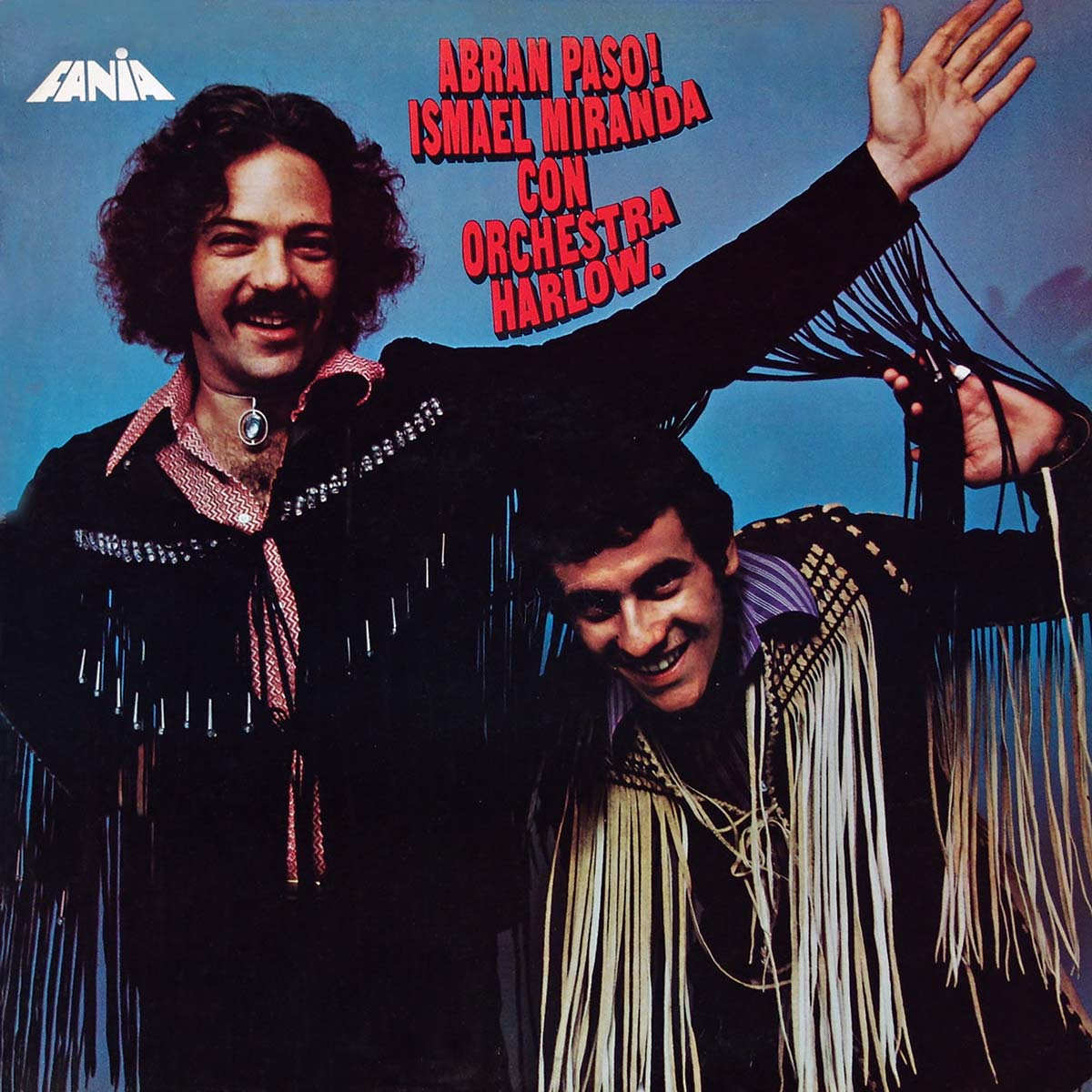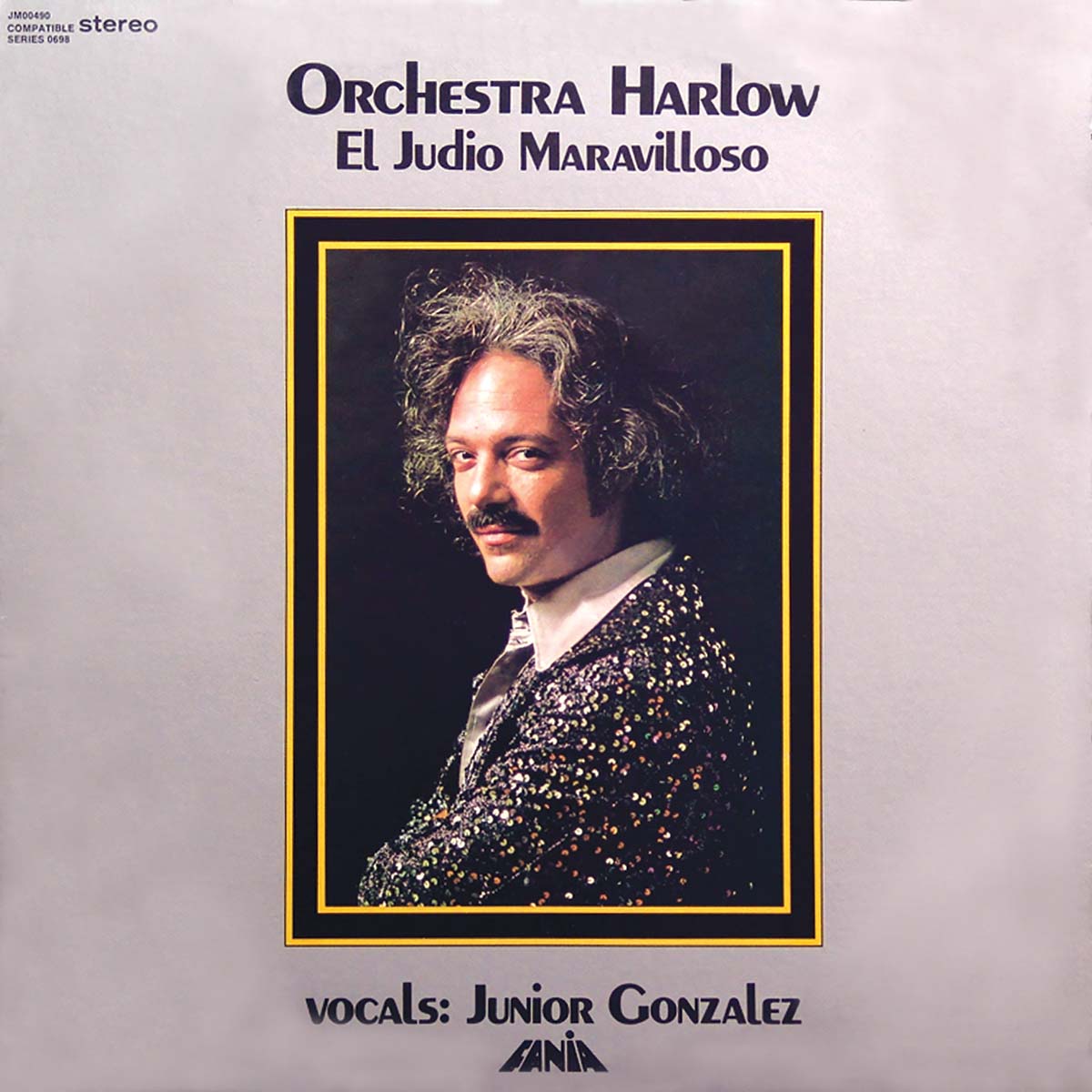
Here, singer Ismael Miranda takes a front and center stand as composer and lead singer before recording one more final album with Larry Harlow in 1971 and going solo. The statement here was “make way”—and the reason for photographing Miranda separating the fringes of Harlow’s jacket while making his way up from under the Harlow Orchestra.
A host of the best arrangers of the time choreographed the music to the lyrics. In this album, a young Miranda spreads his composing wings by writing five of the nine tunes starting with the title hit, “Abran Paso”.
Heralding his bravura with a strong call and response between the trumpets and the trombones, Javier Vasquez’ arrangement conforms to the bold lyrics by having the brass join and harmonize with each other making room for Miranda’s charging soneos. Manny Oquendo’s bongo beats between the notes add a hair-standing dimension that picks up the skin and like a reflex, makes you move. Rounding out the rhythm section with Frankie Rodriguez on congas, while the timbales are deftly handled by Phil Newsum, an original Harlow band member from New York’s East Harlem barrio. As a result, “Abran Paso” is a self-defining and empowering creed of cultural independence: bold and arrogant while similarly spiritual, sensitive and caring. Another Miranda number, “Donde Llevas El Son” recalls the Alegre Label process of prefacing the music with a repartee between the artists. Here they talk about the direction of the rhythm son.
The Afro-Cuban son montuno then hits hard while tightly receding into a laid back almost cha-cha feel. Harlow keeps his solo rhythmic, well spoken and fluidly flowing with everything that’s going on around him, including the funky thumping of Joe Santiago’s bass lines framing the counterbeats of the bongo and conga. Hugo Gonzalez’ “Se Casa La Rumba” picks up the pace in a dancy, saucy stepping style where Maelito and Justo Betancourt (who’s on coro along with Yayo El Indio and Marcelino Guerra) talk during the mambo just before the ‘bones come in with a moña followed by the trumpets of Larry Spencer and Ralph Castrello in counterpoint rhythm to the trombones of Lewis Kahn and Leopoldo Pineda. “Abandonada Fue” recounts the tale of a man deceived by a woman.
Another Miranda number, this one speaks to deception and betrayal, featuring a dynamic Harlow piano solo that touches on the classical before retreating back to the típico. Sabroso! The Tite Curet Alonso, “Vengo Virao” adds extra fuel to Miranda’s fire, comparing the singer’s arrival to that of a shark’s: agitated, concentrated and deadly. Move out the way because he’s coming through and he’s coming sideways…Miranda brings down the orishas calling forth Chango. The Miranda penned “Oigan Bien Mi Guaguancó” is a nicely paced dancer’s cadence recalling Cuban musicians that opened musical paths decades before such as Los Papines, Chocolate y Sus Estrellas, Chappotin, and Barroso. The coro, bass and rhythm come into sync here underscoring the need to sing this guaguanco. Listen well, as they updated the genre to reflect its urban, New York setting. “Ayer Me Enteré” is a classic Curet Alonso bolero, deep felt and emotionally moving as done by Miranda.
With melodic piano lines coloring the laments of unrequited love, the entire ensemble is featured in a tightly woven blend of quality music as good to listen as it is to snuggle. Salsa turns into rock on “Rise Up” done one year earlier with Harlow’s rock band Ambergris (translation: whale puke). Everyone’s singing in English calling an end to racism, injustice and war. A product of its time, Harlow had the fringe jackets that grace the cover made at Woodstock. A tasty conga solo by Frankie Rodriguez is worth a listen. Back to Miranda and his “Dolor y Amor” – nothing but salsa gorda here.
Throw-down danceable, hard-driving and ass kicking is what this album’s all about.
Album Credits: Larry Harlow – Piano Phil Newsum -Timbales Manny Oquendo – Bongo Frankie Rodriguez – Congas Larry Spencer – Trumpet Ralph Castrello – Trumpet Lewis Kahn – Trombone Leopoldo Pineda – Trombone Yomo Toro – Tres Joe Santiago – Bass Chorus – Marcelino Guerra, Yayo El Indio, Justo Betancourt Arrangements – Javier Vasquez, Larry Harlow, Bobby Valentín, Charlie Palmieri, Marty Sheller and Charlie Cameleri Producer – Jerry Masucci Recording Dirctor – Larry Harlow Mixed – Irv Greenbaum and Larry Harlow Engineer – Irv Greenbaum
Written by Aurora Flores



